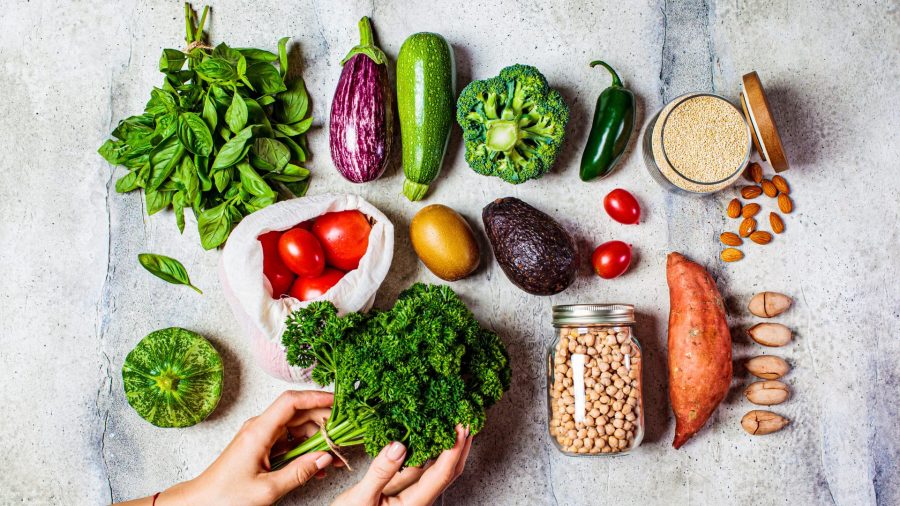Plant Based Beef vs. Traditional Meat: Which Is Better for the Environment?
Plant Based Beef vs. Traditional Meat: Which Is Better for the Environment?
Blog Article
Everything About Healthy And Balanced Food: Benefits of Checking Out Plant Based Choices
The discussion surrounding plant-based diet plans has actually acquired considerable interest in recent times. Several people are checking out the prospective health and wellness advantages, nutritional benefits, and ecological impacts linked with these nutritional choices. As people become a lot more aware of their food's influence on health and sustainability, concerns emerge regarding the practicalities of embracing such a lifestyle. What specific adjustments can one expect, and just how might these selections reshape not just individual health yet likewise the earth's future?
Recognizing Plant-Based Diet Plans
Many individuals associate plant-based diets generally with vegetarianism or veganism, these diet plans can encompass a broad range of eating patterns that prioritize entire, minimally refined plant foods. Such diets commonly consist of fruits, vegetables, whole grains, seeds, vegetables, and nuts, while limiting or eliminating animal items. This versatility enables people to tailor their dietary options according to personal choices and nutritional needs. Some might adopt a mostly plant-based diet while still occasionally consuming meat or dairy, typically referred to as a flexitarian approach. The focus continues to be on integrating even more plant foods, which can cause a varied variety of dishes and tastes. Comprehending these numerous analyses of plant-based eating is vital for appreciating its accessibility and charm in contemporary food culture.
Health And Wellness Conveniences of Plant-Based Foods
The health benefits of plant-based foods are substantial, supplying a nutrient thickness advantage that sustains total wellness. Study shows that these foods can enhance heart health and play a vital duty in efficient weight monitoring. By including extra plant-based alternatives, people might enhance their nutritional choices and advertise long-lasting wellness.
Nutrient Thickness Advantage
Nutrient density plays a crucial role in the wellness advantages of plant-based foods, making them a compelling choice for those looking for a well balanced diet regimen. Plant-based foods, such as fruits, vegetables, legumes, nuts, and whole grains, are commonly abundant in essential vitamins, minerals, and antioxidants while being lower in calories. This high nutrient thickness allows people to take in less calories while still satisfying their nutritional requirements. Furthermore, these foods are loaded with nutritional fiber, advertising digestive system wellness and assisting in weight administration. By integrating nutrient-dense plant-based options, consumers can boost their overall health and wellness, support their body immune systems, and decrease the risk of chronic illness. Ultimately, the nutrient density of plant-based foods underscores their significance in a health-conscious way of living.
Heart Health Renovation

Weight Management Support
Along with promoting heart wellness, a plant-based diet regimen can significantly assist in weight monitoring. This dietary strategy stresses whole foods such as fruits, vegetables, legumes, nuts, and entire grains, which are generally lower in calories and greater in fiber compared to animal-based products. The high fiber web content aids boost satiety, reducing general calorie intake. Plant-based diet plans are commonly abundant in necessary nutrients while low in harmful fats, making it much easier to keep a healthy weight. Research shows that individuals who embrace a plant-based way of life tend to have lower body mass indexes (BMIs) and experience more effective weight management contrasted to those who consume meat-heavy diets. Subsequently, welcoming plant-based choices is a critical option for efficient weight administration
Nutritional Value of Plant-Based Components
Plant-based active ingredients are abundant in crucial nutrients, providing a diverse range of vitamins, minerals, and antioxidants that add to overall wellness. A comparison of protein resources exposes that while pet items are frequently viewed as premium, numerous plant-based alternatives provide sufficient healthy protein and other valuable compounds. Comprehending the nutritional value of these ingredients can assist people make notified dietary selections.
Crucial Nutrients in Plants
Nutrient-rich ingredients located in plants supply a diverse selection of necessary nutrients that contribute significantly to overall health and wellness. These active ingredients are rich in vitamins A, C, and K, which sustain immune feature, vision, and blood clot, respectively. On top of that, plants supply vital minerals such as magnesium, potassium, and calcium, essential for heart health, muscle mass function, and bone stamina. The visibility of fiber in plant-based foods aids digestion and advertises a healthy and balanced digestive tract microbiome. Anti-oxidants, located perfectly in veggies and fruits, assistance fight oxidative stress and lower swelling. Many plant foods are low in calories yet high in nutrients, making them a superb selection for those seeking to maintain a healthy and balanced weight while making certain ideal nutrient consumption.

Contrasting Healthy Protein Resources
Protein sources differ substantially in their dietary accounts, with plant-based active ingredients offering one-of-a-kind advantages. Unlike animal healthy proteins, which often have hydrogenated fats and cholesterol, plant proteins have a tendency to be reduced in these unhealthy parts. Legumes, nuts, seeds, and entire grains are abundant in vital amino acids, fiber, vitamins, and minerals. For circumstances, lentils give high healthy protein material alongside considerable iron and folate, while quinoa is a total protein, supplying all nine essential amino acids. In addition, plant-based healthy proteins are typically come with by antioxidants and phytochemicals that sustain why not try here general health. The change to plant-based protein sources not just improves dietary consumption but additionally aligns with lasting dietary methods, minimizing ecological effect and promoting long-lasting health advantages.
Ecological Effect of Plant-Based Consuming
As understanding of environment modification expands, several people are checking out lasting nutritional choices that can considerably decrease their environmental footprint. Plant-based consuming has actually emerged as a substantial contributor to lowering greenhouse gas emissions, which are mostly connected with livestock production. The farming of fruits, veggies, vegetables, and grains commonly needs less sources, such as water and land, contrasted to pet farming. Additionally, plant-based diets can bring about lowered logging, as less land is needed for grazing animals or expanding pet feed. By shifting towards plant-based alternatives, customers can support biodiversity and promote healthier environments. Generally, welcoming plant-based eating not just advantages personal health and wellness however likewise represents an essential action towards ecological sustainability and preservation initiatives.
Overcoming Common Misconceptions
While numerous individuals identify the advantages of a plant-based diet, numerous mistaken beliefs usually hinder them from totally accepting this way of life. A typical belief is that plant-based diets lack sufficient protein; however, numerous plant resources, such as vegetables, nuts, and tofu, offer adequate protein. Additionally, some assume that this diet regimen is expensive, when as a matter of fact, staples like beans, rice, and seasonal veggies can be fairly inexpensive. Another misunderstanding is that plant-based eating is overly limiting, whereas it really offers a varied selection of flavors and foods. Lots of fret that a plant-based diet plan might lead to deficiencies, yet with correct planning, individuals can get all needed nutrients, including minerals and vitamins, while enjoying a large range of delicious dishes.
Tips for Transitioning to a Plant-Based Way of life
Making the change to a plant-based way of life can be an enriching experience, though it usually needs some advice to navigate the first modifications. People are encouraged to start progressively, incorporating more fruits, veggies, legumes, and whole grains right into their dishes while reducing meat and dairy usage. Dish planning is vital; preparing an once a week food selection can assist alleviate the adjustment and prevent last-minute undesirable selections. Discovering new dishes and cooking approaches can additionally boost the experience and maintain exhilaration concerning plant-based consuming. Furthermore, signing up with support system or areas can provide inspiration and share valuable suggestions. Remaining notified regarding nourishment assurances balanced meals, avoiding deficiencies while promoting a healthy, satisfying plant-based lifestyle.

Delicious Plant-Based Dish Ideas
Checking out scrumptious plant-based meal concepts can motivate individuals to accept an extra healthy diet regimen. One popular choice is a passionate quinoa salad, featuring cherry tomatoes, cucumber, and a spicy lemon-tahini dressing. One more fave is a full-flavored lentil stew, packed with carrots, celery, and aromatic herbs, excellent for a reassuring dinner. For morning meal, over night review oats made with almond milk, chia seeds, and topped with fresh berries supply a nourishing start to the day. Additionally, a lively veggie stir-fry with tofu and a variety of vibrant veggies can be a quick yet satisfying dish. Luscious avocado salute on whole-grain bread, sprayed with flavors and seeds, uses a straightforward yet flavorful treat. These dishes showcase the variety and richness of plant-based eating.

Frequently Asked Inquiries
Can a Plant-Based Diet Regimen Supply Enough Healthy Protein?
The concern of whether a plant-based diet can provide enough protein prevails. Countless sources, consisting of beans, nuts, seeds, and whole grains, can fulfill protein requires effectively, sustaining a balanced and nourishing diet for individuals.
Are Plant-Based Diet Plans Ideal for Children?
The viability of plant-based diet plans for kids relies on cautious preparation. Sufficient nutrients have to be assured, consisting of vitamins, minerals, and proteins. With correct guidance, such diet plans can sustain healthy growth and development in kids.
Just how Do I Dine Out on a Plant-Based Diet plan?
Eating in restaurants on a plant-based diet includes looking for restaurants with diverse food selections, asking for alterations, and exploring vegan-friendly options. Planning in advance and communicating nutritional choices can enhance the dining experience while preserving nutritional choices.
What Are Typical Irritants in Plant-Based Foods?
Common check this site out allergens in plant-based foods include soy, gluten, nuts, and seeds - BBQ Sauces. Individuals adhering to a plant-based diet regimen must recognize these irritants and check out tags carefully to avoid negative responses and ensure safe usage
Can Plant-Based Diets Assist With Fat Burning?
Research indicates that embracing a plant-based diet regimen might promote weight loss due to its generally reduced calorie thickness and greater fiber material. This mix can improve satiety, aiding people handle their caloric intake efficiently. Lots of individuals connect plant-based diet plans primarily with vegetarianism or veganism, these diets can encompass a broad variety of eating patterns that prioritize entire, minimally refined plant foods. Nutrient density plays a necessary duty in the health and wellness benefits of plant-based foods, making them a compelling option for those seeking a balanced diet regimen. Plant-based diet regimens have actually been revealed to substantially boost heart health and wellness, as they typically include elements that sustain cardio function. In addition to advertising heart health and wellness, a plant-based diet plan can considerably help in weight administration. A common belief is that plant-based diets lack enough protein; however, numerous plant resources, such as vegetables, nuts, and tofu, provide enough protein.
Report this page